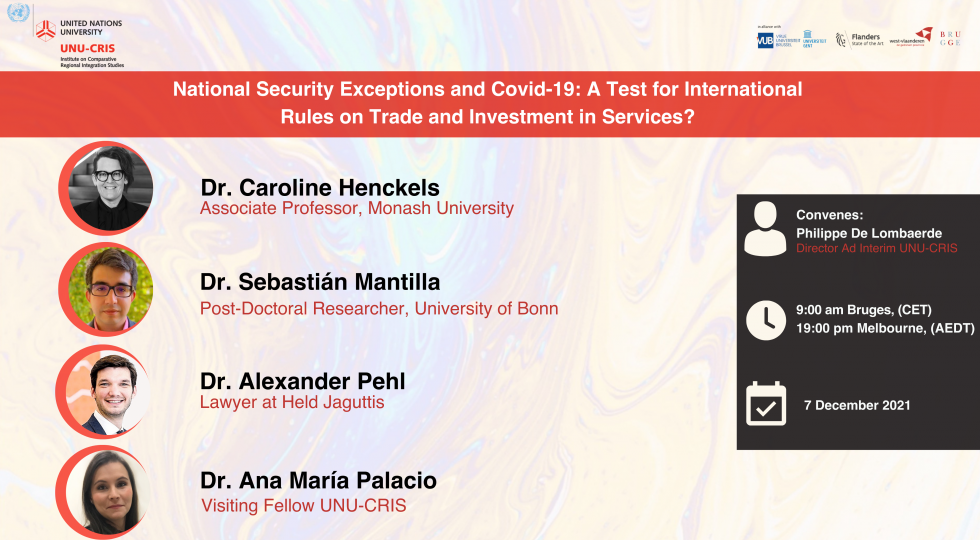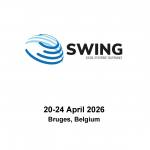Webinar: National Security Exceptions and Covid-19: A Test for International Rules on Trade and Investment in Services?

09:00 – 10:00 (CET) / 19:00 – 20:00 (AEDT)
In a global context where governments are still grappling with the health, social, and economic effects of the Covid-19 emergency, security exceptions in international agreements feature in debates as potential avenues to justify the various restrictive trade and investment measures implemented by governments. Discussions include appeals to the national security exception in the Agreement on Trade-Related Aspects of Intellectual Property Rights (TRIPS) to suspend the enforcement of patent rights to allow for the imports and local manufacturing of Covid-19 vaccines.
There is also a real (or perceived) risk that governments may rely on this type of exception to circumvent international commitments under regional trade and investment agreements. This risk could materialise with the expanding notion of national security to cover not only military or defence interests but also other realms such as food security, energy security, cyber-security, climate security and recently, health security.
Although debates on national security preceded the pandemic, with the United States vs. China trade/tech “war” making the headlines, the Covid-19 crisis has fuelled these debates. It has done so by contributing a compelling and visible frame to justify government measures on the grounds of health security, economic security, and emergency response.
Join us in discussing the multifaceted challenges in balancing States’ regulatory space and the need to ensure legal predictability for economic operators having to traverse the securitisation of economic terrain within the new Geoeconomic Order.
Key Questions
The key questions this webinar will address include:
- What are the main features that underpin the design of national security exceptions in regional/bilateral trade and investment agreements?
- Do unilateral restrictive measures on trade and investment adopted by governments during the pandemic have justification? Are they permitted within the architecture of regional preferential and investment agreements?
- Is the Covid-19 pandemic likely to affect the way governments negotiate security exceptions in regional economic agreements?
- Are national security exceptions likely to play a role as defences for respondent states in future investor-state-disputes and state-to-state disputes arising from the measures adopted during the Covid-19 emergency?
Programme
Opening Remarks
- Philippe De Lombaerde, Director Ad Interim, UNU-CRIS
Panel Discussion
-
Sebastián Mantilla Blanco & Alexander Pehl
National Security Exceptions in International Trade and Investment Agreements: Trends and Rationale -
Ana Maria Palacio Valencia
The Covid-19 Test for Preferential Trade Agreements: National Security Exceptions and Trade and Investment Restrictive Measures in Services -
Caroline Henckels
Should regional preferential trade agreements and international investment agreements contain national security exceptions?
Q&A
Closing Remarks
REGISTER HERE
This event will take place virtually via Zoom.
Attendees and participants of UNU events may appear in event-related photography, screen captures, videos, and/or audio. By attending this event, you are giving consent for UNU to use these images, audio, and video for purposes related to UNU’s work, including publications, websites, and digital and social media platforms. If you do not want UNU to use your image, audio, or video, please contact UNU prior to your attendance at the event.
Panellists

Alexander Pehl
Dr. Alexander Pehl is a lawyer at Held Jaguttis, a law firm which specializes in legal advice on complex regulatory and public commercial law matters for international clients.
Alexander studied law at the Universities of Münster and Seville. After graduating, he worked as a Research Assistant at the Institute for Public Law, Department European Union Law at the University of Bonn. During his legal clerkship at the Higher Regional Court of Cologne, he worked inter alia for the German Federal Ministry for Economic Cooperation and Development and the Permanent Mission of the Federal Republic of Germany at the United Nations in New York.

Sebastián Mantilla Blanco
Dr. Sebastián is a Post-Doctoral Researcher at the Institute for Public Law of the University of Bonn (Germany). He has also been a Visiting Professor at Universidad de La Sabana (Colombia). His main areas of research are general public international law and international economic law. He holds a Doctorate in Law (Dr. Iur.) from the University of Bonn, a Master’s degree (LL.M.) from the University of Bonn, and a law degree (LL.B. equivalent) from the Pontificia Universidad Javeriana in Bogotá (Colombia).
His English-language publications include the books Full Protection and Security in International Investment Law (Springer 2019) and National Security Exceptions in International Trade and Investment Agreements (Springer 2020, coauthored with A. Pehl).
Sebastián is also an independent Counsel of Zuleta Abogados Asociados (Colombia). His areas of expertise include international investment law, arbitration, and human rights.

Caroline Henckels
Dr. Caroline Henckels is an Associate Professor in the Faculty of Law at Monash University. Caroline researches in the areas of public international law (with a focus on international economic law) and comparative public law. She is a member of the Editorial Board of the Journal of International Economic Law, UNCTAD's Transnational Corporations journal, and the Alternative Law Journal, and is an Associate Editor of the Journal of World Investment and Trade.
Before joining Monash, Caroline was a Vice-Chancellor's Postdoctoral Research Fellow in Law at the University of New South Wales. She holds a PhD from the University of Cambridge, an LLM from the University of Melbourne and an LLB from Victoria University of Wellington.

Ana María Palacio Valencia
Ana María Palacio Valencia joined UNU-CRIS as a virtual Visiting Research Fellow. She recently obtained her PhD in Law at the University of Melbourne, Australia, with a dissertation examining the Pacific Alliance regional mechanism. The title of her thesis was: ‘Of Blind People, Elephants and the Pacific Alliance Integration: Institutionalist Account and Proposals for Change’.
She holds a Master of Laws from the University of Melbourne, graduate diplomas in business law from Deakin University and Externado University, and a Bachelor of Laws from EAFIT University in Colombia.
Prior to undertaking her doctoral studies, Ana Maria worked as a legal adviser for the Ministry of Trade, Industry and Tourism in Colombia on international economic law topics such as technical barriers to trade and services regulation.
Upcoming Events
Similar Events
No events found.


